Book Reviews
Book Reviews
The Greatest Story Never Told, Until Now by Albert Lynn Barcroft
Ralph Moody
Ralph Owen Moody
December 16, 1898 – June 28, 1982
Ralph Moody was an American author who wrote 17 novels and autobiographies largely about the American West (though a few are set in New England). He was born in East Rochester, New Hampshire in 1898 but moved to Colorado with his family when he was eight in the hopes that a dry climate would improve his father Charles's tuberculosis. Moody detailed his experiences in Colorado in the first book of the Little Britches series, Little Britches: Father and I Were Ranchers. After his father died, eleven-year-old Moody assumed the duties of the "man of the house". He and his sister Grace combined ingenuity with hard work in a variety of odd jobs to help their mother provide for their large family. more on Moody
We used these 7 books as part of the "raising boys" training along with a couple of other publications.
Herold Bell Wright
During the first quarter of the twentieth century the novels of Harold Bell Wright (1872-1944) outsold every other American writer. Wright's pivotal issues were always moral, and he spent much time delving into the emotional and spiritual struggles of the heroes. The hero was never the person with the fastest gun, but the one with the strongest character. For many modern readers those issues are still relevant.
Herold's books are free on line is someone knows the link and wants to put in a review please do.
Jane Austen
Born in 1775, Jane Austen published four of her six novels anonymously. Her work was not widely read until the late nineteenth century, and her fame grew from then on. Known for her wit and sharp insight into social conventions, her novels about love, relationships, and society are more popular year after year. She has earned a place in history as one of the most cherished writers of English literature.
Jane Austen's books are excellent and I would highly recommend them in training young people the importance of morality in life choices. There also numerous films available.
The Uncle Eric Series
The Uncle Eric series of books is written by Richard Maybury for young and old alike. Mr. Maybury plays the part of an economist writing a series of letters to his niece or nephew.
Using stories and examples, he gives clear, simple explanations of topics that are generally thought to be too difficult for anyone but experts.
The Uncle Eric books are fantastic! We've used them in our homeschool curriculum. I'd recommend them for anyone...not just children. If you're going to use them for homeschool curriculum, Bluestocking Press (publisher) also publishes workbooks for some of the books.
- Whatever Happened to Penny Candy? - Easy to understand economics and explains the differenc between money with real value and funny money. Also, examines the history of money. This is one of our favorites!
- Whatever Happened to Justice? - Same principle applied to the judicial system. Again, very easy to understand. He examines the differences between natures law and the laws (rules) of men. He examines the 2 basic laws: 1) Do all you have agreed to do, and 2) Do not encroach on other persons or their property. Also one of our favorites!
Other Uncle Eric titles:
- Uncle Eric Talks About Personal, Career and Financial Security
- Ancient Rome: How it affects you today
- The Money Mystery
- World War I
- The Clipper Ship Strategy
- World War II
- Are You A Liberal, Conservative, or Confused?
Outliers: The Story of Success
by: Malcolm Gladwell
This is a book about successful people and why they're successful. Success is often attributed to environmental factors and/or individual effort. Outliers looks at these factors by exploring the biographies of well known success cases. Some of the cases studied are: Bill Gates, The Beatles, Hockey Players, Mathemeticians. The main thing I took away from the book is that successful people often spend at least 10,000 hours "practicing" to become really good at what they do. Apply this formula to anyone who is really good at something. Painters, Musicians, Artists, Salespeople, Computer Programmers, Pilots, and on and on. Add to recognized talent a lot of practice honing that talent into a skill, then add in a bit of environmental right timing and you've got a formula for success.
The Family
by: Jeff Sharlet
Many will read this book from a liberal slant and take it as ammunition to support their particular "us vs. them" philosophy. In my estimation, it exposes the fact that republican v. democrat, conservative v. liberal, or any other label you want to use, only masks the fact that they are all on the same team. At the highest levels of power; corporate and political, people who are enemies in public, are working together to promote the same agenda...keeping their religion on top. That religion is the religion of the state.
The Maker's Diet
by: Jordan Rubin
Garbage in...garbage out! That's the basic premise of this book. Jordan Rubin tells the story of his personal, near death struggle with diet and sickness. It's a mix of autobiography and cookbook. As a young man, he went from healthy youth to near death in a very short time, due to a over prescription of antibiotics and poor diet. He tells of his recovery from Crohns disease and a host of others simply by taking a more holistic approach to his diet and lifestyle. He makes a good case for paying more attention to our gut as an important part of our health. This is a very encouraging book for anyone struggling with health issues.
Crunchy Cons
by: Rod Dreher
Crunchy Cons: How Birkenstocked Burkeans, gun-loving organic gardeners, evangelical free-range farmers, hip homeschooling mamas, right wing nature lovers, and their diverse tribe of countercultural conservatives plan to save America. By: Rod Dreher
The author travels around the country talking to people who are living alternative lifestyles. They are involved in homesteading, organic gardening/husbandry, homeschooling, etc. Things which a lot of us are interested in. The author has found more of us I think. He mentions these people by name and place. I think he's done some of our work for us.
As evidence of this I include the following quotes from the book:
1)"Connie said most folks have blind confidence that what they purchase in the supermarket is going to be safe and good for them. Mike agreed." "I think it's because government has become our god, " he said. "We trust it to inspect our food, we trust it to educate our children. I'm not saying that government doesn't have a place in that, but beyond that, we need to take responsibility individually for our lives."
2)"Robert said living the life of homeschooling agrarians has not always been easy or remunerative, but the rewards are priceless.
What do I gain? The hearts of my children, for one. I gain the ability to be the dominant influence in their life, because I'm home, working with them. I gain the satisfaction of doing something I know is good for people. I gain opportunities to minister to people. I have a number of customers that are recovering from cancer or other illnesses who are into nutritional therapy because they have seen the effect that good nutrition has had on their health. There's a great deal of satisfaction in that. You know, the satisfaction of feeling like I'm walking in God's will for our lives. I never felt like that when I was in the corporate rat race. It's like a guy once told me, the only things running in a rat race are rats."
"Being with his children, working their farm, and having home-church on Sunday mornings fulfills this man, who saw his father break himself working a job he hated so he could retire early and enjoy the good life - only to have his heart give out on him just eight years after he retired."
The solutions they promote may not be the right ones, but the people seem to be very similar in their thinking and attitudes. Many of them seem to be searching for alternative solutions to the ones the governments of man propose.
Simplicity Parenting
by: Kim John Payne
The subtitle is "Using the Extraordinary Power of Less to Raise Calmer, Happier, & More Secure Kids"....I can't remember now how I came upon this title, but I'm sure it was right up there with Heaven on Earth (review still to come) & You Are Your Child's First Teacher. There is also a supportive website w/ a "starter kit" to get you reading right away: http://www.simplicityparenting.com/
The chapters are simple: first he outlines why we should simplify, moves to what he calls soul fever, then touches on the 4 main areas we can simplify our lives (& thus bring about calmer, happier more secure children - and mom & dad too). These 4 areas are the environment (read toys, mostly, but he also talks about food), rhythm (what to expect each day, even if it is different every day), schedules (some things may need to go), and filtering out the adult world. We don't have TV so the news is pretty much gone other than online stuff or NPR for a few minutes in the morning...but it's not just the TV. He also addresses the things adults talk about to & in front of their children - and even talking too much about nothing. Since I just finished the book & this last chapter is on my mind I want to start there with a few points that struck me: I was taught to give a running commentary to our babies all day, telling them what I was doing, what they were doing, blah blah blah all day long. If this continues into toddlerhood & beyond they WILL start to tune you out. Why did Laura & Mary listen to & obey Pa? Because he didn't say much! The 3 things to filter on your mouth: Is it true? (takes care of gossip) Is it kind? Is it necessary? This is where the running commentary gets shortened to a few words, not the constant droning all day, or the deep adult explanation for a simple 3 year old's question about why the sun is hot. Now, Papa J & I are believers in explaining things to our children, and letting them see who we are & sharing that with them. But we didn't go into it ALL when they were little (like under 8 or 10) - it was a gradual thing, adding more explanations, more depth, more teaching as they got older & needed more. My first encounter with this idea was while visiting a Waldorf kindergarten earlier this year...I think it can be taken to an extreme in either direction but for sure we don't need to be talking all day or sharing adult things with our little children as much as we do.
One example of an adult issue that I didn't filter out came back last night in the 5 year old's bad dream (yeah, I've been up since 4am so why am I doing this right now??). We watched a newer version of the Sound of Music a few days ago (we hadn't watched the original yet, they're the same play just different actors) & she had a bad dream that the army was going to come get daddy & big brother and make them fight in a war. Heavy stuff for a little one, right? I sat right there during the movie & explained what was going on because of course she had questions while it was happening....but maybe I should have turned it off or blown over it? Still trying to figure that kind of thing out, but there's an example of something maybe left to older children.
A point Payne makes in the Why section is that all children are quirky :0) Totally true! They all, like each of us, have their personal little quirks - but - with a consistent pattern of stress they can slide right into hyperactivity, or oppositional defiance disorder, or ADD, OCD, or any number of labels for which schools, doctors & parents drug their children. His equation goes like this: q+s=d, or quirk plus stress equals disorder.
In Soul Fevers he compares a physical fever to something not quite right in our children, affecting their behavior & emotional climate of our homes. When a child has a physical fever, you may stay home from work, change that child's diet for a few days, have more quiet & calm til they feel better - change your whole schedule around. When a child has an emotional, or Soul Fever, you need to do the same. Stop, pay attention. Change things around til you figure out what it is & then make permanent changes. "When your child seems to deserve affection least, that's when they need it most"....
How about some statistics? In the Environment section it quotes "Born to Buy" by Juliet Schor as saying that the average American child receives SEVENTY toys per year. Children's play has become 'less focused on activities, and more on the things involved, the toys themselves'. Too much stuff leads to too many choices, which leads to being overwhelmed. And this leads to undervaluing all of them & to hold out for whatever elusive thing isn't offered - "MORE!" - what pseudo power!
So what are the options? Have you noticed that small children love to help? Do you brush them off or find a way to get them involved? It takes a lot longer at first for sure - but the confidence your children will gain and actual help to you it brings later can't even be measured. Involve them in the work of family life. Small brooms, simple sewing projects, washing dishes & folding washcloths - all very simple ways to work and experience life together. Of course there will still be toys, but the more natural and flexible the toy the better it will be used; elaborate or character-specific dress ups or toys just aren't open enough for a wide range of pretend. If the toys are simple & open ended, they will provide the most varied & sustained possibilities for pretend play. Outdoor play is something that you should strive for every day, no matter the weather (this is my own opinion & wasn't stated as directly in the book). Time in nature is restorative & helps us recover from stresses of daily life - even improves our capacity to pay attention.
Food has been one we've addressed to varying degrees in our home over the years. We've not really had any food 'battles' or people who won't eat, but our teens have experimented with vegetarianism & eating all raw diets that have just about driven us crazy. While the little ones get what we make, the big ones are capable of making their own. So - there are some nights where there are 3 different meals being prepared for dinner! We adapt when we can, but our older ones know they need to make their own if what we've made for dinner doesn't meet their requirements. Our food itself IS much more simple than it used to be - even if the prep may be a bit more complicated b/c of the big age gap & various meals being prepared. The highly processed & sweetened foods are gone, as are the fake food ingredients. Payne asks us to question ourselves as we go grocery shopping, "Is this food designed to nourish, or to entertain? To stimulate? Was this food designed, or was it grown? Did it exist 50 years ago? Can I identify or pronounce it's ingredients? There are 17,000 "new food products" introduced to shoppers in this country every year!!!"
How about sports? Payne says that organized sports can present a 'packaged world' of set rules & procedures to very young children, rather than a world of their own making. Self directed play builds multiple & emotional intelligences, fostering the skills necessary to navigate an uncertain future, one that will demand increasing flexibility & creative problem solving (summary mine). This kind of independent thinking is what got the Montessori schools closed during WW2 Germany! Do we want children who just follow rules & specialize in a sport by age 8? Families with children under this age (even 9 or 10) can simplify their lives tremendously just by emphasizing free play over organized sports & martial arts (not to mention a greater chance of raising children who are able to think for themselves!). The stages of play allow for team & competitive sports, just not as such early ages as children are being pushed these days...younger, faster, more more more. In early childhood, little ones begin with solitary play, then parallel play, and finally 'let's pretend'. Having been free to imagine, a child is then ready to learn how to play the game. You don't want your children getting worn out & burned out just at the age when they are developmentally ready to start playing organized sports! Large family? Maybe something everyone can enjoy is the way to go - swim team or archery maybe. The schedules will be closer to the same & the "home team" - the family - can still stick together somewhat. Some families have several children involved in sports, but they have to be during different seasons so that everyone isn't doing everything all at once.
Toward the end of the book I was struck by something I've always done! Requests. "When everything is a request you have another form of verbal clutter: Taylor, howya doing? Would you like to get in the car now? What do you think? Can you buckle up that seat belt? Will you shut the door? Sweetie, is that you throwing those toys up to the front? Would you please stop?" Yikes! This has been me in the past! Not so much with the two little ones but boy I did this a lot with our older ones. Directions can & should be - get this - direct ;0) "I can't drive with distractions. We don't throw anything in the car". Period. Whew that is easier. I've got to just directly quote here b/c it's dead on: "Requests may seem like "gentler" forms of communication, but with so many of them they're very easy to ignore, and their uniformity make it hard for a child to know what's really important. They invite response, but not really, so the overall effect is one of background noise".
Publications Available:
There are numerous books and news articles, sermons, video files and audios available at the website HisHolyChurch.org
The Higher Liberty
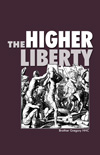
The Higher Liberty is an iconoclastic examination of Romans 13 and other specious teachings which are an indictment the modern Church revealing a fuller gospel of the Kingdom for this world and the next. The consistent warnings of the prophets throughout the entire Bible and the purpose of the Church appointed by Christ as one form of government shines new light on modern apostasy. The simple truth of how God made you to be free souls, serving Him in Spirit and in Truth may bear witness in your hearts and minds.
Much of what is in this book will allow you to see the truth of the gospel in comparison to those who do contrary to the ways of God and make His word to none effect and have brought you back into a bondage to the gods many of the world through damnable heresies. Arm yourselves with His truth that will set you free. chapter-by-chapter or Order
The Covenants of the gods
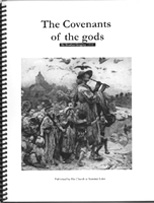
The Covenants of the gods is an iconoclastic exposé unveiling a unique apology of the prophets and their purpose. It examines chapter-by-chapter the contractual nature of the governments of men through a progression of legal precepts in their context of history, language, and law within their relationship to the ancient Biblical texts.
Cecil B. DeMille asked in the movie, The Ten Commandments, “Are men the property of the state? Or are they free souls under God?" This same battle continues throughout the world.
Vanity inclines man to blame others for his undesirable state, “but the slothful shall be under tribute.” If you want to be set free then you must want to know the whole truth and then, “Thou shalt make no covenant with them, nor with their gods.” Exodus 23:32 Order
The Free Church Report
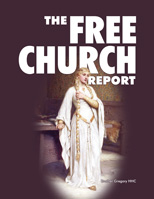
The Free Church Report presents a unique path for the modern Church according to the nature of the first century Church by explaining the duty and purposes of that institution appointed by Christ. While Rome declined under runaway inflation, corrupt government, martial law, and endless threats of war, the Christians found an alternative to the men who “called themselves benefactors but exercised authority one over the other.”
The early Christian knew rights and responsibilities were indivisible. They sought the right to be ruled by God by taking back their responsibility, through the service of “called out” ministers who lived in the world, but were not of it. Their government benefits came through a divine network instituted in their hearts and minds by faith, hope, and charity under the perfect law of liberty as their Qorban of the unrighteous mammon failed the Roman society. Order
Thy Kingdom Comes
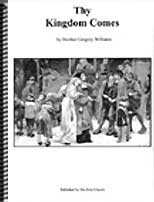
Thy Kingdom Comes is an examination of the dominion of God from generation to generation, Abraham through the early Church. Chapter-by-chapter cleans a window of history to reveal what Abraham, early Israel and the early Christians were really doing and how they began to go wrong.
Abraham, Moses, and Jesus promoted a system of self-government that set men free and kept them free souls under God despite the plagues of Egypt, hardships in the wilderness, the apostasy of the Pharisees, and the decline and fall of the Roman Empire. The precepts of that faith, the spiritual self-discipline of the heart and mind of Christ guiding the people in the will of the Father, has protected and sustained faithful societies in freedom of those who truly seeks the dominion of God and His righteousness. “Thy kingdom come. Thy will be done in earth, as [it is] in heaven.” Mt 6:10
Thy Kingdom Come – Peace be to this house, The Prologue Auto read audio
Contracts, Covenants and Constitutions
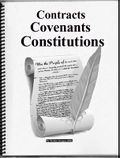
Why did John Adams say that the United States Constitution "... was made only for a moral and religious people. It is wholly inadequate to the government of any other"? The book "Contracts, Covenants, and Constitutions" reveals the contrasting nature of a free government and those established by contracts or constitutions. The changes in the reach of the modern American government and the morals of society have altered the path and destiny of a once free people. Chapter-by-chapter this book, free online, brings the original Constitution of the United States into historical contexts and that moral perspective. It also takes a detailed look at the prohibition in the Bible concerning government by contract, and the prohibitions on delegated authority for constitutions we have failed to address. Order
HHC Books
are all online for free in numerous formats with audio support and hundreds of articles along with study series and audio explanations and podcasts. What has been freely shared with the author is freely shared with you and that is an essential element to the true keys of the kingdom.
Covenants of the gods |
Thy Kingdom Comes |
The Free Church Report |
The Higher Liberty |
Contracts, Covenants and Constitutions |
List |
ORDER
HHC Book Specs
In finding a printer
We are always looking for better ways to produce the books produced by HHC.
The key number is the "price each" for pages printed.
A typical amount for printing is 5 cents per page with a bulk price at 4.5 cents. Some printers will go as low as 3.5 cents.
Question is:
If a short run price is 5 cents what is the page count that drops it to 4.5 or 4 cents or even 3.5 cents???
A $1 charge for coil binding is pretty standard.
HHC Book specs
We have three books which are 8½X11 And two 2 books which are 5½X8½.
The three 8½X11 are about 150 to 155 pages equaling about 75 to 80 full sheets of paper printed two sides.
Card stock covers front and back printing two sides [white]. No color printing. Coil binding
The two 5½X8½ are about 150 to 155 pages equaling about 75 to 80 half sheets of paper printed two sides. Card stock covers [5½X8½].front and back printing two sides [white].
No color printing.
Coil binding
Pamphlet specs There also a number of pamphlets that are 5½X8½ but stapled. These range from 12 to 24 numbered pages 5½X8½ plus a card stock cover.
A twelve page pamphlet is 3 sheets [8½X11] printed two sides, folded and stapled. Cover is cream colored card stock. It is one sheet[8½X11] also printed two sides and folded to make the cover.
Example: 24 page pamphlet is 6 sheets printed two sides with an additional cover folded and stapled.
Question: Where is the price break in sheet count to obtain a bulk price discount?
Education |
Homeschooling |
Continuing Education |
Sudbury Schools |
Public schools
Public Education |
Common Core |
Not free Education |
Schools as Tools |
HHC publications
Homeschooled |
Homeschooling by the Numbers |
Norman Dodd |
The Reece Committee
How to Enroll Online |
Movies |
Books |
HHC Online Courses |
Teach |
Online Courses